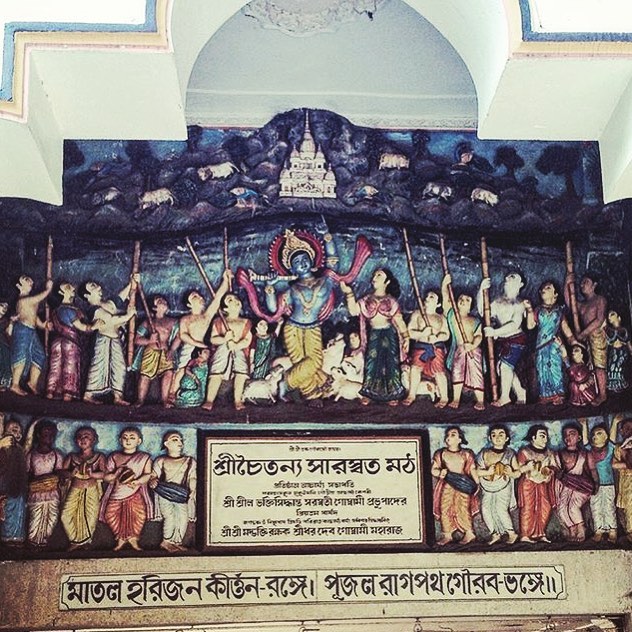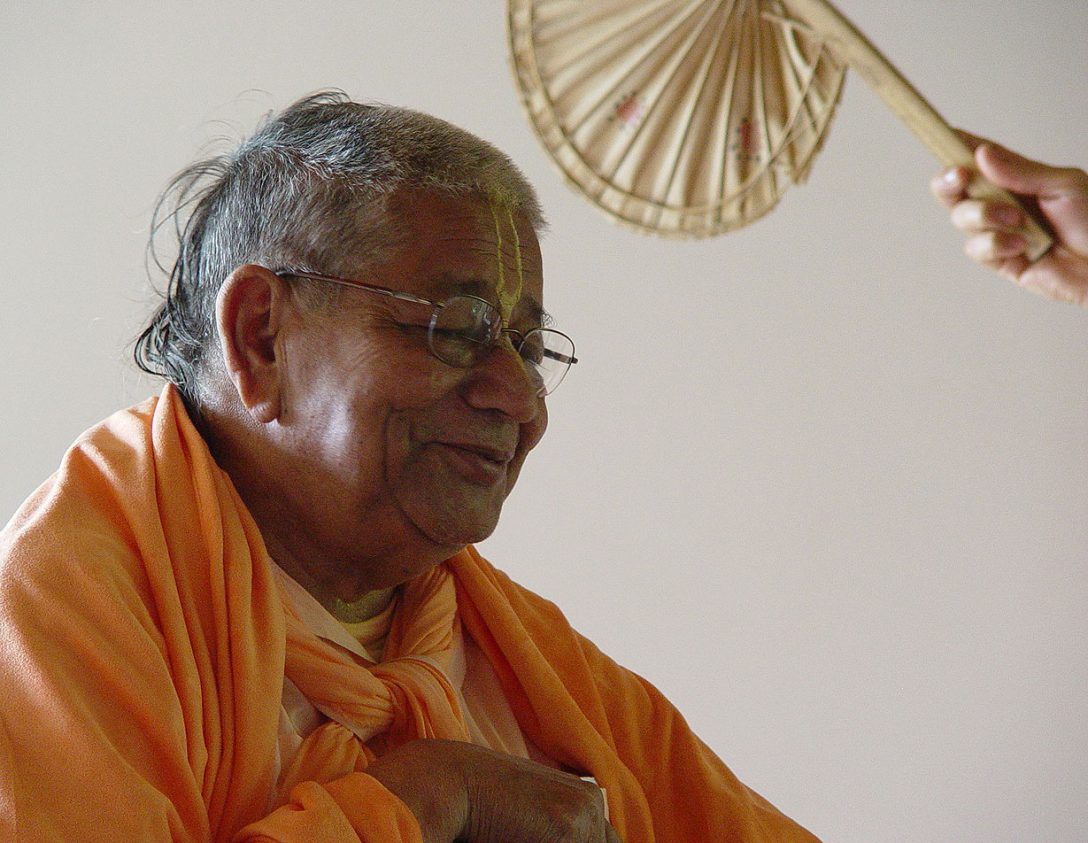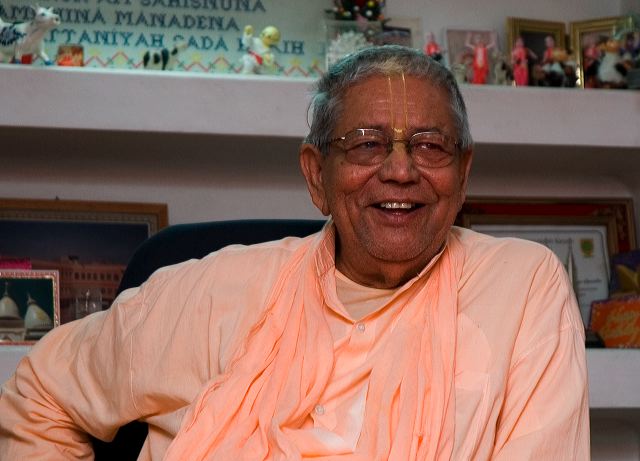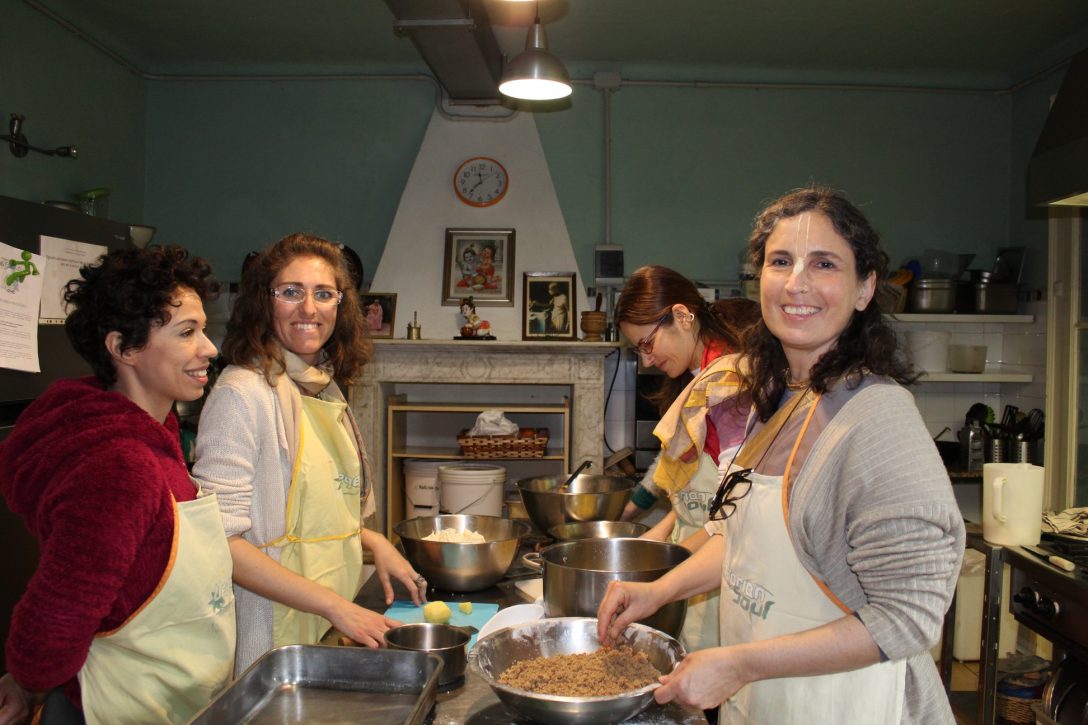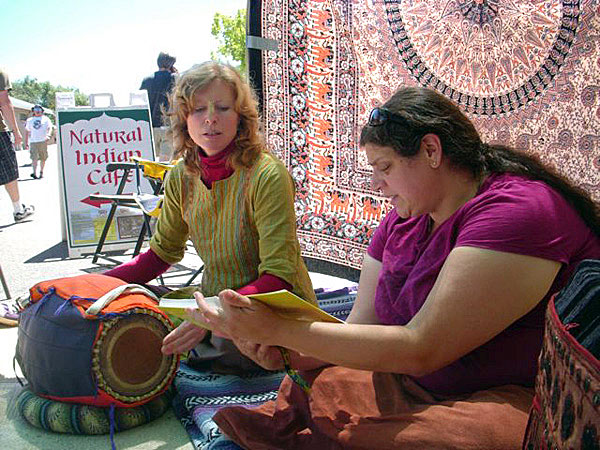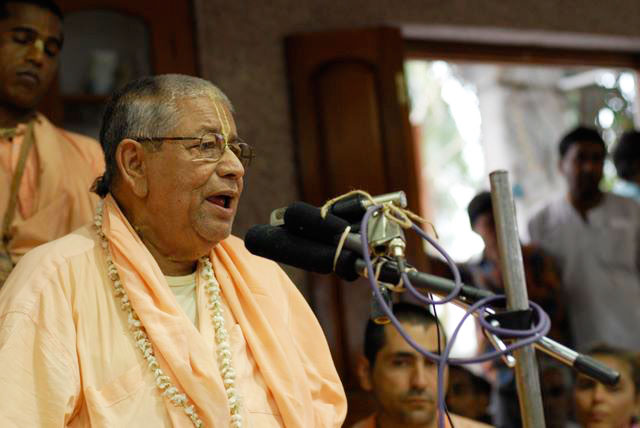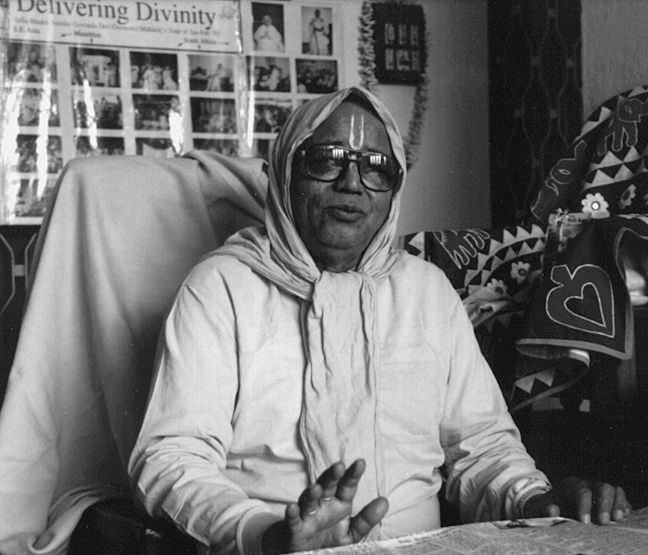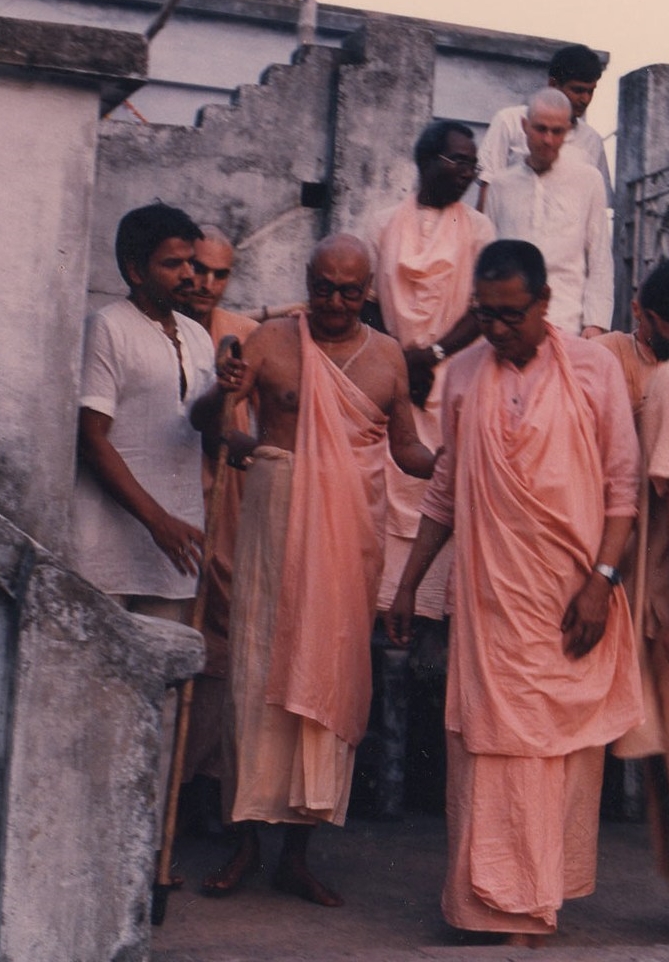“May that Lord of the cows be satisfied by us. Who is Indra when compared to Kṛṣṇa? Kṛṣṇa is the master of Indra. And yet He has appeared as the master of cows; the Supreme Absolute Truth has accepted a simple position as the keeper of cows. Superficially, He is a mere cowherd boy. But let that cowherd boy, who holds within Him the power of controlling the whole universe, be satisfied with us. We want to worship that Lord who has taken the humble position of the king of the cows.”
Excerpt from Loving Search for the Lost Servant by our Param Gurudev, His Divine Grace Srila B.R. Sridhara Deva-Goswami.
deve varṣati yajña-viplava-ruṣā vajrāśma-varṣānilaiḥ
sīdat-pāla-paśu-stri ātma-śaraṇaṁ dṛṣṭvānukampy utsmayam
utpāṭyaika-kareṇa śailam abalo līlochchhilīndhraṁ yathā
bibhrad goṣṭham apān mahendra-mada-bhit prīyān na indro gavām
(Śrīmad Bhāgavatam: 10.26.25)
The very gist of the Govardhan-līlā, the very substance of the Pastime, is represented in this verse. The milkmen in Vṛndāvan used to observe a sacrifice to satisfy the king of heaven, Indra, at whose command the rain, clouds, and other subtle elementary powers move. The main wealth of the cowherd men is the cow, and the cow’s main food is grass. Only rain can produce grass, and so the cowherd men used to perform sacrifice to satisfy the subtle power who is supposed to be in command of natural substances like rain.
By satisfying Indra, favourable rains would come and there would be sufficient grass. The cows could then graze easily on the grass and generate milk profusely. The gopas, the cowherd men and their families, used to make different preparations from the milk, sell them in the marketplace, and in that way earn their livelihood.
As the grazing ground in one place was finished, they would move from one forest to another. Only for the purpose of obtaining grass for the cows, Kṛṣṇa’s father Nanda Mahārāj and the cowherd men would wander from one place to the next. In this way, they lived sometimes in Vṛndāvan, sometimes in Nanda Grām, and sometimes in Gokul.
Once, Kṛṣṇa wanted to assert Himself and modify the worship of Indra. He wanted to establish His own domain, Vṛndāvan, in its pristine glory.
Although He was only a boy, He was a boy of extraordinary capacity. He was only seven years old. But in the Padma-purāṇa, it is said that the development or growth of special personalities is one and a half times that of ordinary persons. Although Kṛṣṇa was only seven years old by ordinary calculation, He was eleven according to general calculation.
Kṛṣṇa said, “Why should we perform this sacrifice to Indra? We have a direct concern with Govardhan Hill and not Indra.” He announced this idea to the gopas, and somehow, willingly or reluctantly, the gopas submitted to the advice of Kṛṣṇa. Nanda Mahārāj was influenced by affection for his son, and, because he was the king, he told them, “This time we shall worship Govardhan Hill and not Indra.”
Indra insulted
And so the gopas, the milkmen of Vṛndāvan, followed Kṛṣṇa’s advice—some reluctantly and some willingly—and they began the sacrifice for Govardhan Hill. This news reached Indra, who thought to himself: “A boy of special capacity lives there. Now He has taken the leadership of Vṛndāvan and stopped this ancient sacrifice to me. For a long time it was the tradition of the gopas to perform sacrifice to satisfy me, and now one boy is the cause of stopping my sacrifice!” He was very much enraged. Indra ordered the clouds and the wind and the lightning to attack the residents of Vṛndāvan.
According to Vedic understanding, all the elements are personified. In ancient days, the Āryans and rājarṣis, elevated human beings and great sages, used to see everything as persons. They saw everything in a personal way. They thought of the creepers, the trees, and everything else in the environment as persons. They understood that they were all persons who, according to karma, are wandering through the different species of life.
Once, I was asked by a professor of biology about alternatives to Darwinian evolution. I advised him that evolution from consciousness to matter may be understood on the basis of Berkeley’s theory. Whatever we think of is really part of our consciousness. And consciousness means person. Everything that we may be conscious of is a person. We may think of the wind as an inanimate object, but it was thought of in the Vedic line as a person. Lightning, wind, clouds, and rain are all persons. Whatever we consider to be elementary matter, gross and subtle, was all considered by the ancient seers of the truth to be persons.
Indra commanded the wind, the clouds, and the rain to go and devastate the whole area of Gokul Vṛndāvan. “The residents of Vṛndāvan have insulted me!” He said. “They have rejected me, have stopped worshipping me, and are instead worshipping that mountain, that hill of Govardhan. I can’t tolerate this insult! Go and devastate them.” By the order and wrath of Indra, the master of all the higher subtle elements, heavy rain began to fall. And so thunder, hail, and rain simultaneously attacked the whole of Vraja Maṇḍal.
Consequently, all the residents of Vṛndāvan were thrown into a great disaster. Misery, pain, and sorrow afflicted the animals and the protectors of the animals, the gopālas. So, the helpless—the women, children, and animals of Vṛndāvan—had no alternative but to take refuge of Kṛṣṇa. They all came to Kṛṣṇa for relief. They cried, “O Kṛṣṇa! Now what are we to do? You influenced us to stop the sacrifice meant for Indra, and now Indra, being vindictive, has begun to afflict us in this very heavy way. How can we live? Please save us!” They all came to Kṛṣṇa for protection. Seeing this, Kṛṣṇa had much pity for them. Being merciful upon them, He smiled a little, thinking, “They have all come to Me for relief.”
At that time, with only one hand Kṛṣṇa lifted up the Govardhan mountain. For Him, it was a very easy thing; with only one hand, He uprooted the hill and lifted it up as a child lifts a toy ball. And holding up that great mountain, Kṛṣṇa gave protection to all those who were living in Gokul. The men, women, and children of Vṛndāvan brought the cows and all their worldly goods and took shelter beneath Govardhan Hill.
The whole cowherd society was given shelter under that hill. In this way, by lifting Govardhan Hill, Kṛṣṇa gave protection to the residents of Vṛndāvan, and crushed the pride of the lord of heaven, Indra himself.
And so Nanda Mahārāj prays in this verse, “May that Lord of the cows be satisfied by us. Who is Indra when compared to Kṛṣṇa? Kṛṣṇa is the master of Indra. And yet He has appeared as the master of cows; the Supreme Absolute Truth has accepted a simple position as the keeper of cows. Superficially, He is a mere cowherd boy. But let that cowherd boy, who holds within Him the power of controlling the whole universe, be satisfied with us. We want to worship that Lord who has taken the humble position of the king of the cows.”
From this verse of Śrīmad Bhāgavatam, we can understand the position of the Lord’s Pastime at Govardhan. It is also described here that when the Vraja-vāsīs worshipped Him and engaged in sacrifice for His satisfaction, they saw Govardhan Hill as the Supreme Person, extending His hands, accepting the things offered to Him, and feeding Himself.
At that time, Kṛṣṇa pointed out, “You see! You thought that Govardhan Hill was only a heap of stone. No—it is living, it is the Supreme Personality of Godhead.” At that time, Kṛṣṇa revealed Himself as Govardhan Hill and showed how it is also His extended self. According to authorities in our line, Rādhā Kuṇḍa is the extended self of Śrīmatī Rādhārāṇī, and Govardhan is the extended self of Kṛṣṇa. And so we worship a stone from Govardhan Hill, a part of Giridhārī, as Kṛṣṇa Himself. We may understand from this that a part of the infinite is infinite. And yet so feeble is our ordinary vision that although Govardhan-śilā is a part of the infinite, and therefore also infinite, to our material vision it is only a piece of stone.
This Pastime shows that a thing may appear to be ordinary stone, but its possibility is infinite. In the general sense, Einstein’s theory of relativity has announced that anything we see is that thing plus something more. In his own scientific way, he explains that the reality of a thing includes its possibilities, its prospect—reality is not at a standstill.
Reality is not limited to what is seen or conceived by our senses. Our vision or estimation of anything may be limited, but unknown to us, its prospect may be unlimited. Everything has infinite possibility. We do not even know what infinite possibility a particle of sand may have. We do not know what sort of possibility may exist within a leaf of a plant. It may appear ordinary, but it may contain invaluable medicinal properties.
God the beautiful
A part of the infinite is also infinite. The Govardhan-śilā represents Kṛṣṇa as the master and keeper of cows. Within Govardhan is that mild and soft conception of God the beautiful. We beg for His mercy, His affection, and His gracious glance upon us.
That may save us from the negative influence of this material environment. When we try to put a stop to our material form of life and take our course towards Godhead, Kṛṣṇa consciousness, neglecting the imperative duties that are upon us, so many difficulties may come to trouble us, to trap us in our journey towards the ultimate truth. But if we stick to the order of Kṛṣṇa, He will protect us. Kṛṣṇa confirms this in Bhagavad-gītā:
sarva-dharmān parityajya mām ekaṁ śaraṇaṁ vraja
ahaṁ tvāṁ sarva-pāpebhyo mokṣayiṣyāmi mā śuchaḥ
He says, “Abandon all other conceptions of duty and just surrender unto Me. Have no fear. I shall protect you and free you from all sinful reactions that might arise from neglecting your ordinary duties.”
Different material tendencies and mental impulses may attack us—even Indra himself, the king of heaven and the controller of all ordinary activities, may attack us—but if we are attentive towards our goal, if we are careful to read the order of Kṛṣṇa, He will protect us in the shade of His lotus feet. He will give us shelter under the shade of Govardhan Hill, where no Indra will be able to touch our heads. And with full faith that Kṛṣṇa will give us protection, we should try to take shelter under Govardhan Hill and pray: “O Kṛṣṇa, give me protection from all the difficulties that may come to attack me because of my leaving behind my ordinary obligations.”
Although many anomalies may try to catch us, Kṛṣṇa will protect us. And in His representation as Govardhan Hill, that wonderful master of the cows will save us from all sorts of difficulties. How is this possible? God works wonders. His ways are unknown and inconceivable.

